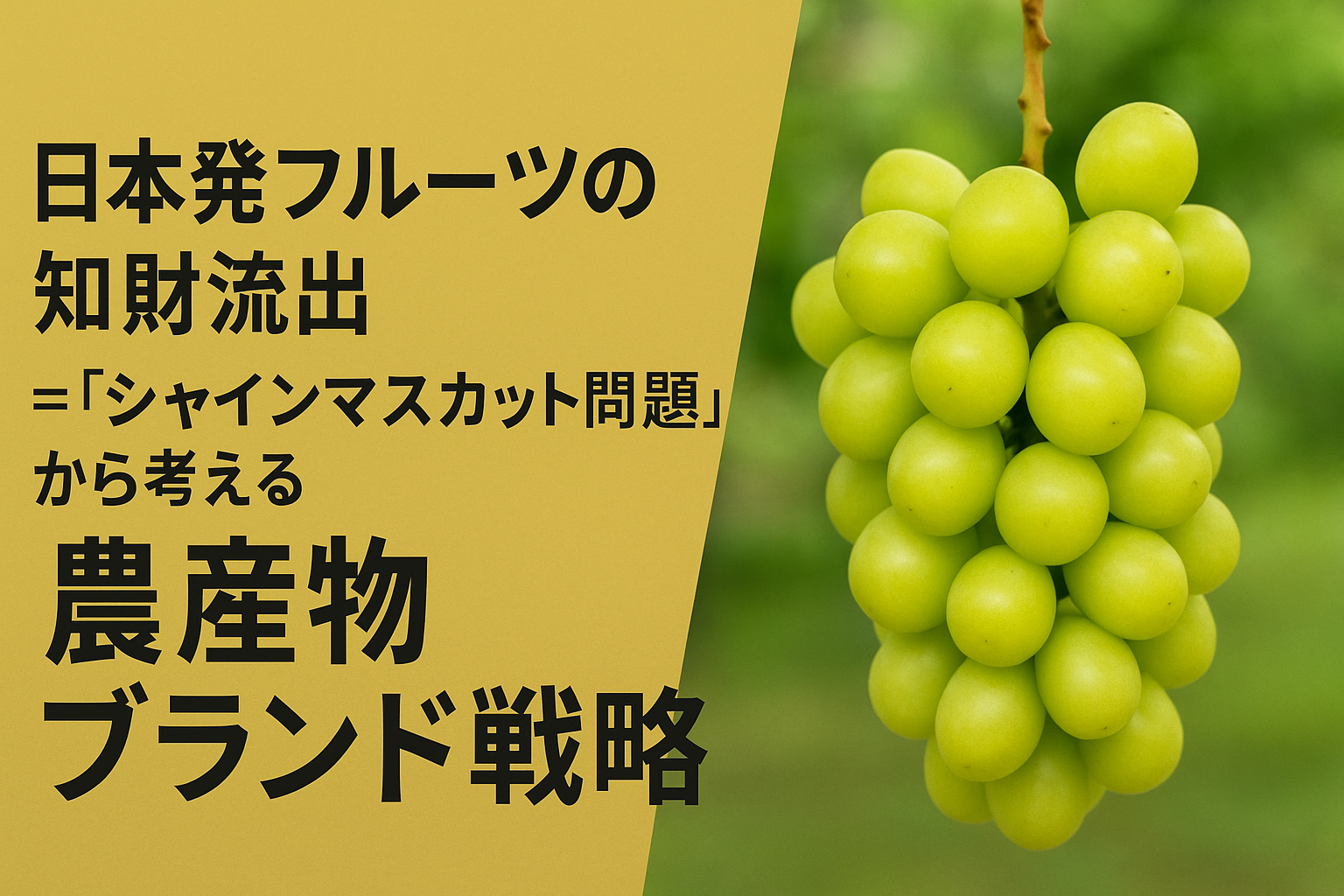A Japanese-bred luxury grape goes “mass-produced” overseas
The Shine Muscat, a premium grape variety developed in Japan, had a domestic cultivation area of 2,673 hectares as of 2022. However, cultivation has expanded dramatically overseas — about 73,700 hectares in China and 6,067 hectares in South Korea, largely through unauthorized and unlicensed propagation.
As a result, Shine Muscat grapes marketed as “Japanese varieties” are now widely distributed abroad, raising concerns about their impact on domestic producers, intellectual property protection, and brand value.
What is happening? — The gap between IP rights and cultivation reality
The variety, developed by Japan’s National Agriculture and Food Research Organization (NARO) over nearly 30 years, is a registered plant variety in Japan. However, it was not registered in foreign countries, meaning cultivation and sale abroad cannot legally be restricted.
Unauthorized leakage and propagation of seedlings have occurred overseas, particularly in China and South Korea. In China, Shine Muscat is estimated to account for about 10% of the nation’s total grape cultivation area, while in South Korea the proportion is estimated at 41%.
Consequently, its status as a premium Japanese brand fruit is being undermined — posing serious risks to exports, pricing, and domestic producers’ profitability.
Domestic responses and contradictions: Licensing proposals vs local resistance
To curb unauthorized overseas production, Japan’s Ministry of Agriculture, Forestry and Fisheries (MAFF) is considering introducing a licensing system. Reports suggest it is exploring licensing arrangements with Japanese companies that have subsidiaries in countries such as New Zealand, allowing them to produce and sell Shine Muscat as “official products.”
However, domestic producers — for instance, in Yamanashi Prefecture — have strongly opposed the idea, arguing that the government should first improve export conditions so that Japanese producers can compete fairly on equal footing. They worry that granting foreign licenses before export infrastructure matures will further weaken domestic competitiveness.
Critics also question the effectiveness of such licensing — particularly in ensuring quality control, preventing re-leakage, and enforcing compliance. Many ask: “Once officially licensed, can we really stop secondary and tertiary outflows?”
Analysis: The crossroads of intellectual property, branding, and agribusiness
From the intersection of IP strategy, agricultural branding, and international business, several key issues emerge.
Insufficient intellectual property protection
Although the variety was registered in Japan, the absence of international registrations allowed unlicensed overseas cultivation — a core structural weakness.
In hindsight, what was needed was not only varietal development but also a global IP and licensing strategy anticipating potential export and cultivation markets.
Brand value vs. mass production and price erosion
The spread of low-cost overseas production risks diluting Japan’s high-value branding strategy. Domestically, Shine Muscat had become synonymous with luxury fruit, but mass production and discount retail abroad may erode its perceived scarcity and price premium.
This presents a profound structural challenge for Japanese agriculture as it seeks to prioritize value over volume.
Merits and risks of an overseas licensing strategy
Licensing could generate royalty income while integrating overseas producers into a regulated ecosystem that maintains brand control — a concept some commentators, such as Toru Hashimoto, have hailed as “the strongest business model.”
However, key risks remain:
- Licensees may breach contracts, leading to secondary leaks or misuse.
- Overseas products could compete directly with Japanese-grown grapes, driving down domestic prices.
- Quality control failures could cause brand damage.
Perspectives from domestic producers
Producers insist, “First, give us a fair export environment.”
Without robust export channels, issuing foreign licenses could mean forfeiting the domestic producers’ advantage. Moreover, stopping physical outflow of seedlings or cuttings is technically difficult — propagation from pruning material is feasible.
Thus, without deep understanding of production realities, export systems, and regional contexts, policies risk backfiring.
Recommended countermeasures and future outlook
Building on the lessons of this case, Japan’s future agricultural and brand strategies should include:
- Strengthening international IP registration and strategy
Register new varieties early in key export and potential cultivation countries. Establish legal frameworks to prevent unauthorized use.
- Developing a global licensing and monitoring system
Formalize agreements with foreign partners specifying royalties, quality standards, and distribution controls. Implement audits, DNA testing, and brand-label management.
- Supporting domestic producers and export infrastructure
Enhance domestic production capacity, export logistics, and quarantine systems so Japanese products can compete on an equal stage.
- Differentiating brand value and consumer messaging
Market domestic Shine Muscat as “Japan-grown, origin-certified, quality-guaranteed” — promoting value beyond price.
- Strengthening seed and seedling management
Enforce tracking systems for propagation material, establish traceability, and codify internal rules at the farmer and cooperative level.
Outlook and personal perspective
Maintaining the domestic price premium for Shine Muscat will likely become increasingly difficult. If lower-priced foreign products capture demand in Southeast Asia, Japan’s luxury-fruit market could shrink.
However, if Japan successfully cements the perception that “Japanese origin equals quality and authenticity,” this could become a powerful competitive advantage — marking a shift from volume-based to value-based competition.
This case may also spark greater awareness of IP-driven business models in Japan’s agricultural and horticultural sectors — where revenue comes not only from producing goods but also from licensing rights.
Nonetheless, institutional, legal, and enforcement challenges remain substantial. Building producer consensus and practical monitoring systems will take time.
A “Field + IP” approach to protect agricultural brands
The Shine Muscat case is more than a story of varietal leakage — it symbolizes Japan’s broader challenge: how to position its agricultural brands amid globalization and IP competition.
Japan’s fruit industry, which has thrived through technological innovation and value creation, must now safeguard those achievements through a comprehensive approach — combining international IP strategy, regional brand management, and systemic protection.
Collaboration among producers, government, and research institutions will be essential.
Ultimately, the future of Japanese agriculture lies in building a system that prioritizes quality and value over quantity — and proves that ethos on the global stage.

